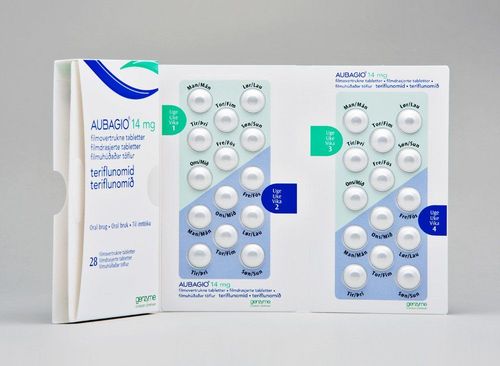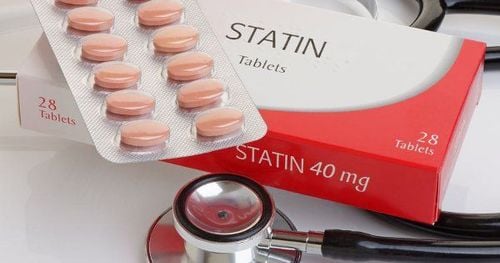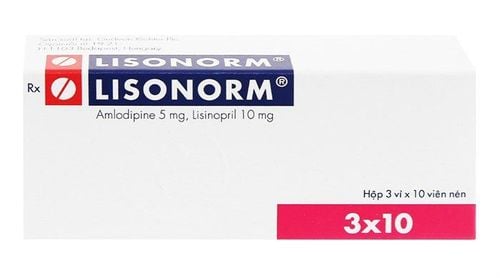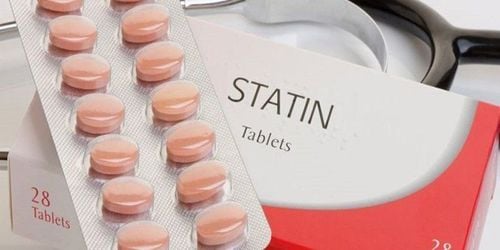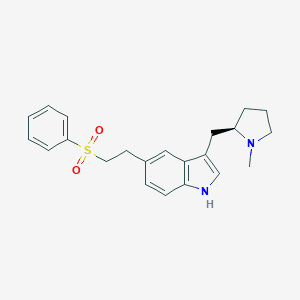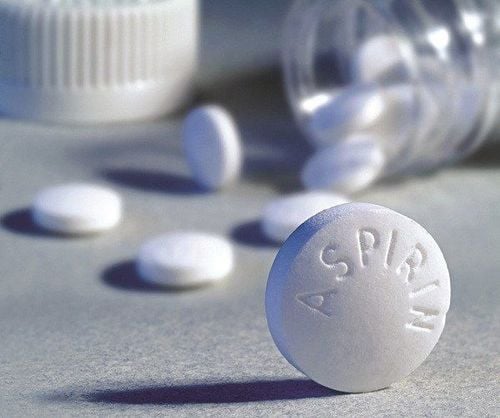This is an automatically translated article.
Hyzaar is a combination of 2 ingredients Losartan and hydrochlorothiazide, used to treat high blood pressure and reduce the risk of cardiovascular disease, stroke, heart attack.
1. What is hyzaar?
Hyzaar has the main ingredient Losartan Potassium, Hydrochlorothiazide, belongs to the group of cardiovascular drugs, prescribed by doctors in the following cases:
Used for patients with high blood pressure Used to reduce the risk of stroke, Cardiovascular disease, myocardial infarction in hypertensive patients with left ventricular hypertrophy. Mechanism of action of the drug:
The combination of Losartan potassium and Hydrochlorothiazide has a synergistic effect to increase the antihypertensive effect. The component Hydrochlorothiazide has the potential to increase plasma renin activity, decrease serum potassium, increase aldosterone secretion and increase angiotensin II.
2. Dosage and usage
How to use: Hyzaar is prepared in the form of tablets and used orally. May be used in combination with other antihypertensive drugs. Because the drug is absorbed into the body unaffected by food, patients can take Hyzaar before or after eating.
Dosage:
When starting treatment, the patient should take a dose of 1 tablet (50mg/12.5mg)/day. If the patient does not improve after 3 weeks or the hypertension is not controlled, the dosage should be increased to 2 tablets/day. Note: Patients should consult their doctor about the dosage of the drug to suit their medical condition. However, do not take more than 2 tablets per day.
For the elderly: The starting dose of Hyzaar can be used as 50/12.5 mg.
Dosage used to reduce the risk of cardiovascular disease and cardiovascular death in hypertensive patients with left ventricular hypertrophy:
The usual dose is 50 mg of losartan, taken once a day. If after a period of time the patient does not achieve the desired reduction in blood pressure, the dose can be adjusted using a combination of losartan and hydrochlorothiazide at a low dose (12.5 mg) and, if necessary, the dose can be increased to losartan 100 mg/hydrochlorothiazide 12.5 mg orally once a day. Contraindications:
The drug is not used in patients who are allergic to Losartan and hydrochlorothiazide components. Hyzaar is not recommended in patients with severe hepatic or renal impairment, creatinine clearance < 30 mL/min. Patients with anuria Do not use together with aliskiren in patients with diabetes Overdose and treatment:
Manifestations: There are no reports of patients' reactions to an overdose of Hyzaar. .
Treatment method: Treatment according to symptoms, the doctor will appoint to stop using Hyzaar and monitor the patient's health. Common treatment measures are inducing vomiting if the patient takes Hyzaar for a short time, rehydration, electrolyte balance, and treatment of hypotension according to the usual procedures.
3. Side effects
Common reactions: Affects the digestive system with symptoms such as diarrhea, abdominal pain, nausea, dyspepsia. Systemic reactions: Asthenia, fatigue, chest pain. Nervous system reactions: Headache, insomnia, dizziness. Musculoskeletal reactions: Cramps, leg pain, back pain, myalgia. Urinary related: Renal failure, impaired renal function. On the respiratory system: Upper respiratory tract infection, Cough, swollen nose, sinusitis. Hematology with typical symptoms such as mild decrease in red blood cell mass, hyperkalemia, hypoglycemia, hemoglobin.
Uncommon reactions: Effects on eye function such as blurred vision, eye pain, conjunctivitis, decreased vision. Effects on cardiovascular system with manifestations of orthostatic hypotension, angina pectoris, sternum pain, cerebrovascular accident, tachycardia, arrhythmia.
Hematologic-related adverse reactions include anemia, aplastic anemia, purpura, hemolytic anemia, Henoch-Schonlein, purpura, hemolysis, vasculitis, leukopenia, agranulocytosis , decreased platelets.
Effects on the digestive system: Flatulence, constipation, stomach irritation, toothache, dry mouth, flatulence, gastritis, vomiting, persistent constipation, inflammation of the salivary glands, spasms, diarrhea .
Whole body: Facial edema, edema, fever.
Reactions related to the musculoskeletal system with manifestations: Hand pain, shoulder pain, stiffness, musculoskeletal pain, joint swelling, knee pain, arthritis, osteoarthritis, fibromyalgia, muscle weakness.
Neurological reactions: Restlessness, paresthesia, peripheral neuropathy, tremor, depression, memory impairment, migraine, syncope, anxiety disorder, confusion, sleep disturbance, slumber.
Hematological system: With reaction Increase serum creatinine, increase blood urea, increase blood sugar, increase blood uric acid, decrease blood potassium, decrease blood sodium.
Urinary system: Causes nocturia, urinary tract infections.
Reproductive system: Decreased libido, erectile dysfunction, more serious can cause impotence.
Respiratory system: Causes pharyngitis, laryngitis, dyspnea, bronchitis, epistaxis, rhinitis, airway obstruction, respiratory failure including interstitial pneumonia and pulmonary edema.
Skin: Alopecia, dermatitis, dry skin, erythema, flushing, photosensitivity, rash, pruritus, urticaria, diaphoresis.
4. Be careful when using Hyzaar
Use with caution in patients with a history of angioedema and during use should be closely monitored.
Patients with kidney failure may experience electrolyte imbalance, diabetes. Therefore, it is necessary to closely monitor the plasma potassium concentration and creatinine clearance, especially in patients with heart failure and with a creatinine clearance of 30-50 ml/min.
Patients should not co-administer Hyzaar with potassium-sparing diuretics, potassium supplements and potassium-containing salt substitutes with losartan/hydrochlorothiazide.
Particular caution should be exercised in patients with obstructive hypertrophic cardiomyopathy, aortic or mitral stenosis.
For patients with impaired liver function or liver disease in more severe stages, use caution with Hyzaar, because it may cause side effects such as intrahepatic cholestasis, hepatic coma.
In the case of patients with rare hereditary problems of galactose intolerance, the Lapp lactase deficiency or glucose-galactose malabsorption, it is recommended not to use this medicine.
For pregnant women: According to research, Hyzaar can adversely affect the development of the fetus. Therefore, do not use the drug for this case.
Women who are breastfeeding: The hydrochlorothiazide component contained in the drug has the ability to be excreted in breast milk and when used in high doses, inhibits milk production. Therefore, Hyzaar is not recommended during lactation.
5. Hyzaar . drug interactions
Aliskiren: Not to be used concurrently with Hyzaar in patients with diabetes mellitus and renal failure. When using Hyzaar with alcohol, barbiturates or narcotics : May increase specific undesirable side effects such as causing orthostatic hypotension. Do not use in combination with vasoconstrictor amines such as adrenaline: Hyzaar may decrease the response or efficacy of vasoconstrictor amines. Lithium: When Hyzaar is taken with Lithium, it reduces the renal clearance of lithium and poses a high risk of lithium toxicity. Non-Steroidal Anti-Inflammatory Drugs (NSAIDs): There have been reports that the use of non-steroidal anti-inflammatory drugs, including selective cyclooxygenase-2 inhibitors, reduced the effectiveness of the drug. Hypoglycaemic drugs including insulin and other oral drugs: When used with Hyzaar, patients need to adjust the dose of drugs that have the effect of lowering blood sugar. Use in combination with corticosteroids, ACTH, or glycyrrhizin: The side effect is increased electrolyte loss, especially hypokalemia. With the sharing about the use of Hyzaar medicine, we hope to bring users useful information to make the treatment process more effective.




